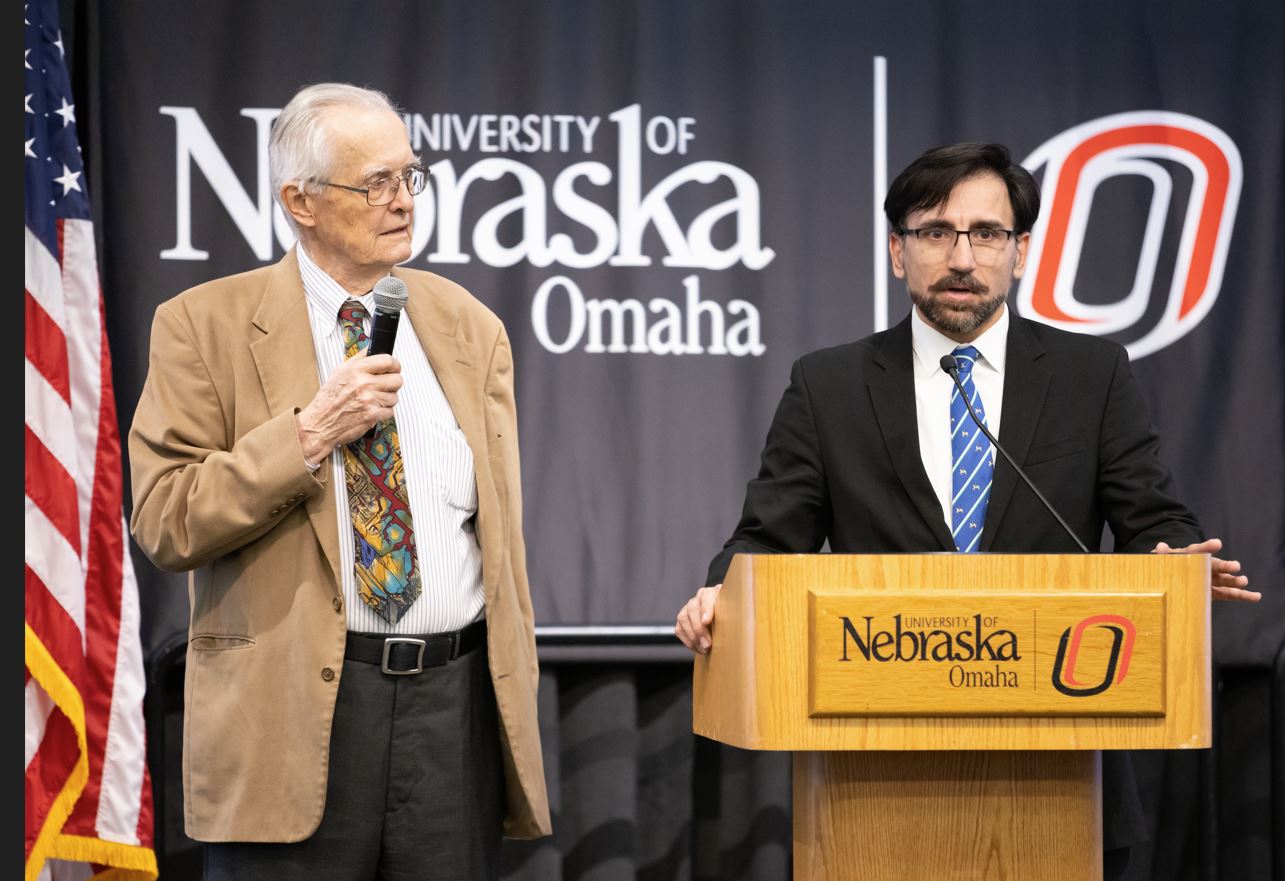In April of 2023, The Center for Afghanistan Studies celebrated 50 years of impact. The celebration was held during the annual CASA (Central Asia and South Asia) Week. The event included a look back at the Center's history, cultural exhibits, a keynote address by Former Ambassador Ronald Neumann, and a luncheon with family members of the founders as well as current and past supporters of the Center.
Summary of the Event and Special Addresses
Below: Chancellor Joanne Li gives an Opening Welcome Address at the Center's 50-Year Celebration.
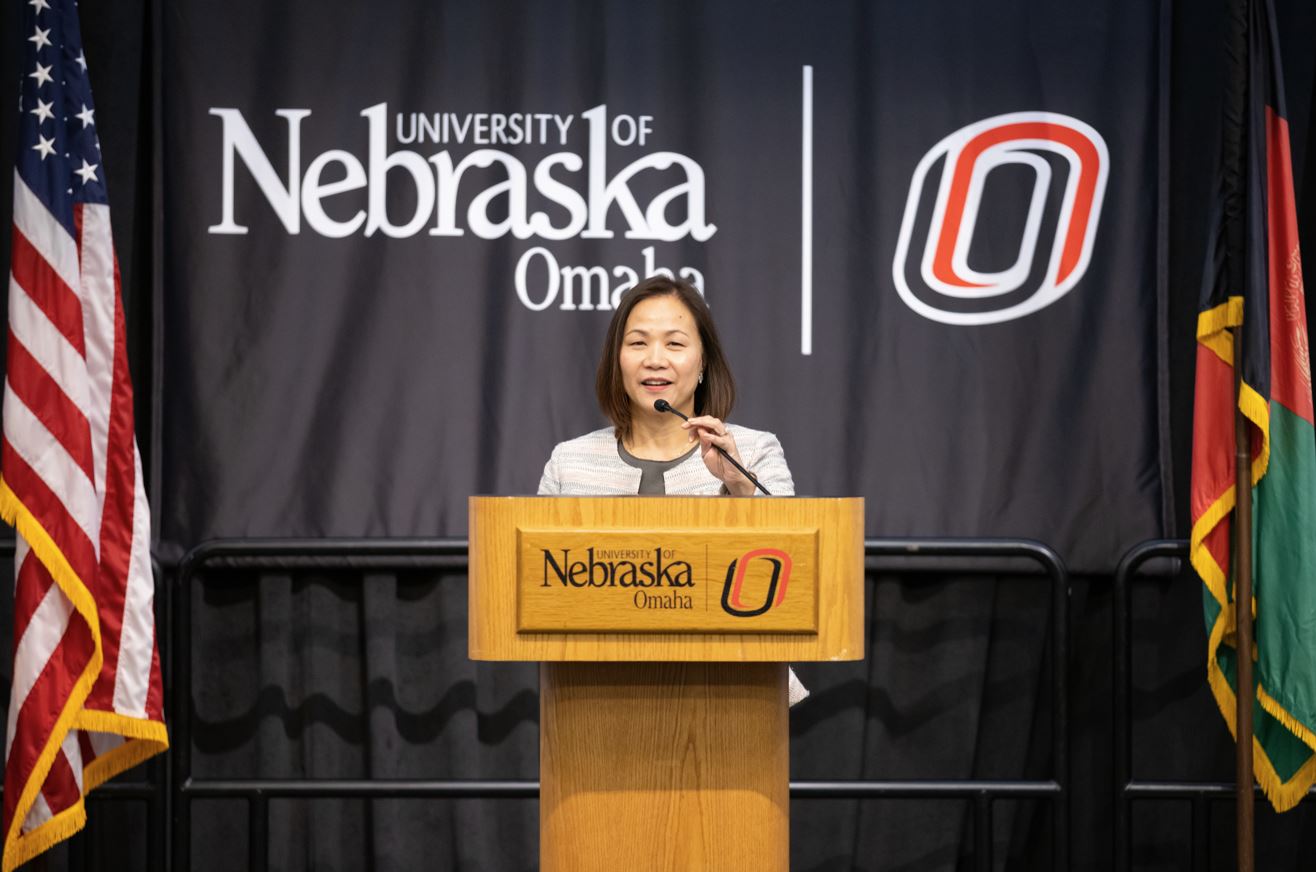
Below: Interim Associate Vice Chancellor for Global Engagement, Jody Neathery-Castro, welcomes the audience to the 50-Year Celebration.
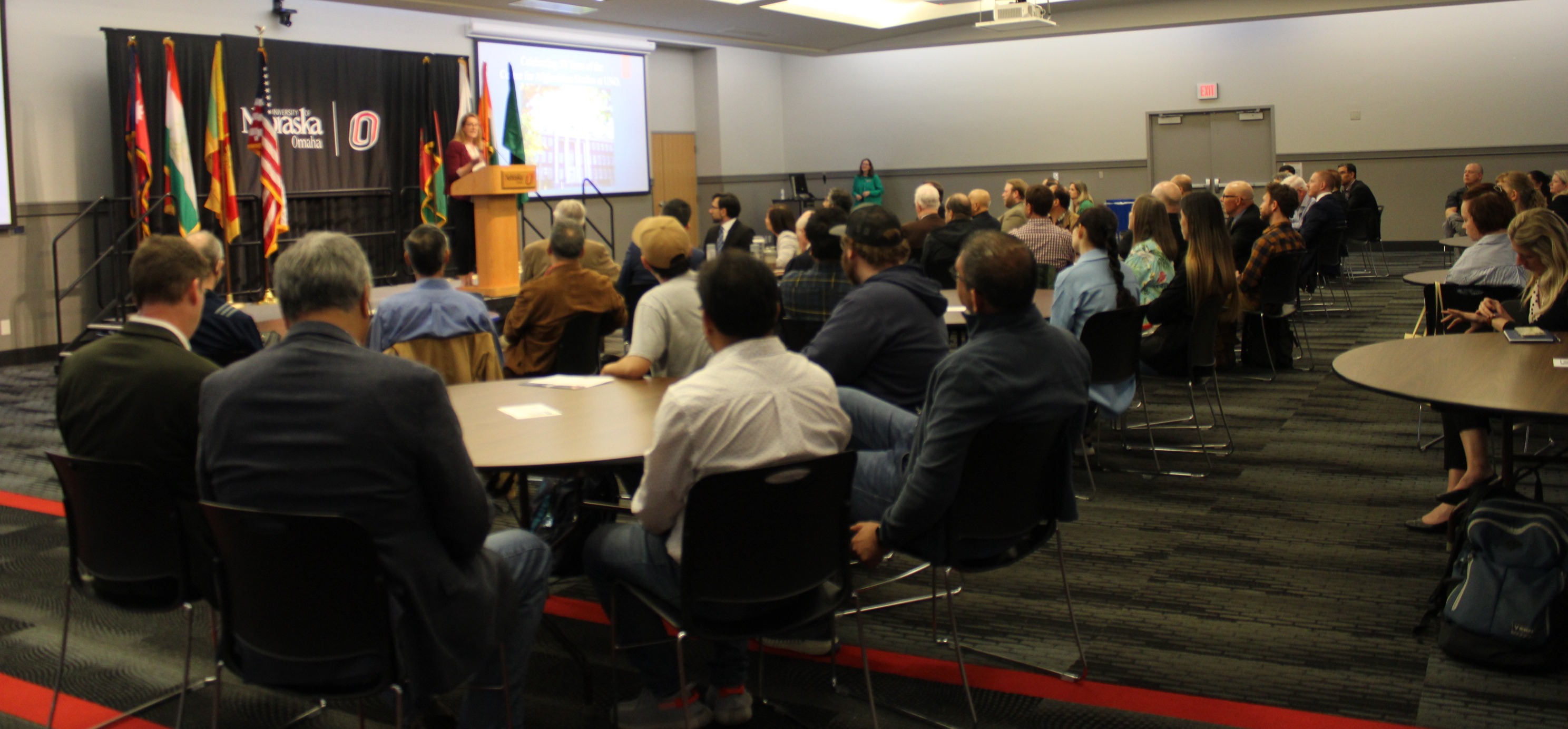
Summary of 50-Year Celebration Welcoming Addresses
As part of its landmark 50th anniversary, the Center for Afghanistan Studies at the University of Nebraska at Omaha (UNO) began its celebration with a series of welcoming addresses that honored the Center’s history, global impact, and enduring mission.
Opening remarks were delivered by Dr. Jody Neathery-Castro, Interim Associate Vice Chancellor for Global Engagement and Professor of Political Science, who underscored the Center’s role within UNO’s international programs and reflected on her own 25-year collaboration with the Center through academic programming and grants. She introduced Chancellor Joanne Li, whose leadership has further expanded UNO’s global reach.
Chancellor Li spoke passionately about UNO’s longstanding commitment to international engagement and highlighted the Center’s early partnership with Kabul University, established in 1975, the first of its kind for UNO. She emphasized that the work of the Center is not just about foreign policy or academic study but is fundamentally about humanity, compassion, and connection.
Reflecting on the events of August 2021, Chancellor Li shared the story of a critical moment early in her tenure, when she received news of a bombing in Kabul during the U.S. withdrawal. She recalled the urgency with which the UNO community, led by the Center, mobilized to help Afghan partners, write support letters, and work with lawmakers to assist with evacuations. These efforts, she noted, demonstrated UNO’s deep institutional compassion and responsibility.
“What is humanity if you don’t feel anything for other people?” she asked, reinforcing UNO’s commitment to global citizenship and ethical leadership.
Chancellor Li stated that the Center’s insight and compassion are qualities that truly expand the knowledge and reach of the university. As Afghanistan and the region changes, the Center is also adapting, but the mission has not changed and will continue. Chancellor Li stated,
“UNO is committed to the Center for Afghanistan Studies, not because we get international fame...but we believe that we are here to serve all populations. We have the Center here because we care and that is the profile of an urban university.”
Following her remarks, Sher Jan Ahmadzai, the Center’s third director in its 50-year history, spoke about the Center’s founding by Dr. Chris Jung in 1972. He recognized the contributions of Dr. Jung’s family and the generations of faculty, staff, and students who have sustained the Center’s mission. With heartfelt gratitude, he acknowledged the presence of the Jung family and other founding figures in the audience, bridging the Center’s rich legacy with its ongoing work.
The welcoming addresses set the tone for a celebration focused not only on past achievements but on the Center’s continued relevance. With a renewed commitment to education, engagement, and advocacy, the University of Nebraska at Omaha reaffirmed its position as a leader in global scholarship, and a steadfast partner to Afghanistan and its people.
Below: Director Sher Jan Ahmadzai and John (Jack) Shroder, Emeritus Professor of Geography and Geology give a presentation about the history of the Center and the expanding vision.
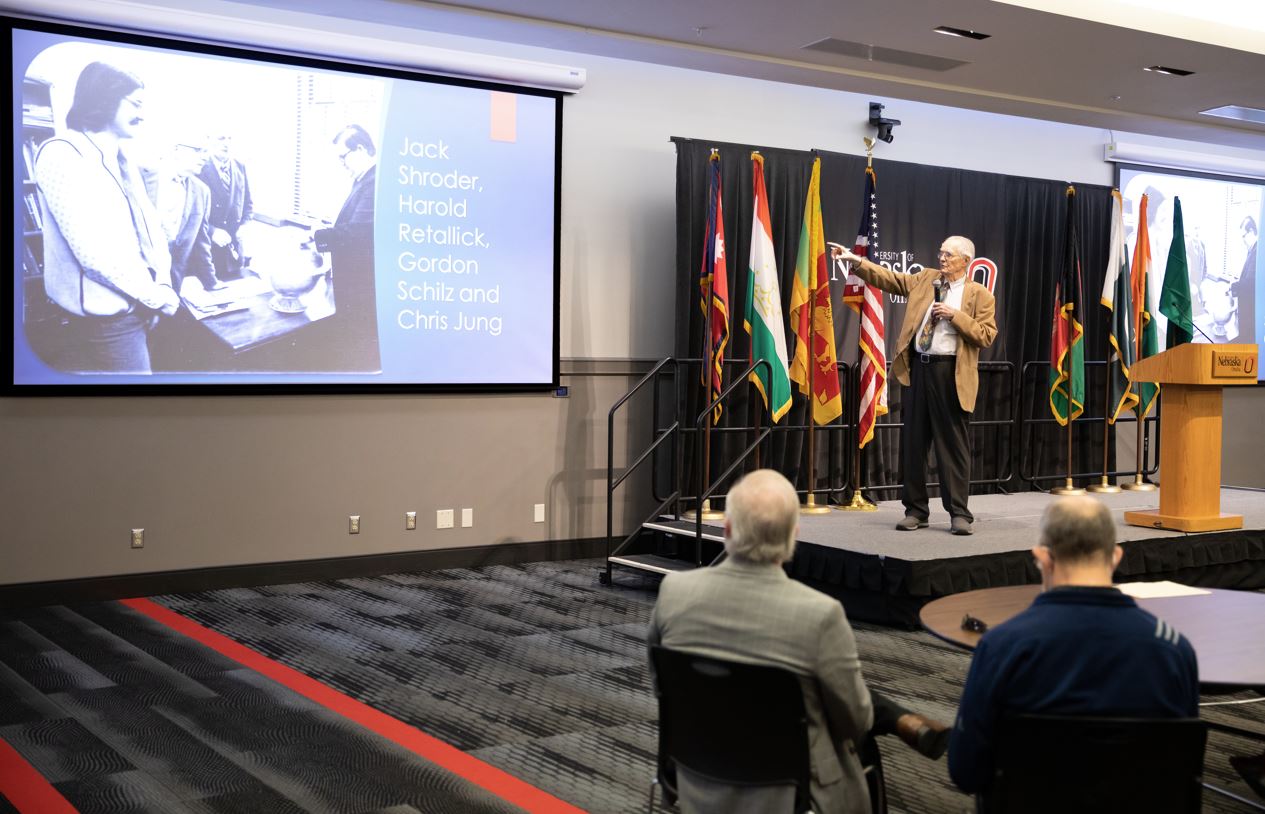
Summary of 50-Year Celebration History and Vision Presentation by Director Ahmadzai and Professor Shroder
Following the welcome addresses, Director Sher Jan Ahmadzai and Professor Emeritus John (Jack) Shroder delivered a comprehensive history presentation, reflecting on five decades of scholarship, international partnerships, and humanitarian impact.
The presentation began with Director Ahmadzai acknowledging the foundational leadership of the Center’s previous directors, including its visionary founder, Dr. Chris Jung, and his immediate successor, Thomas Gouttierre who led the Center for 40 years. Ahmadzai, the Center’s third director, emphasized the Center’s unique, sustained legacy of collaboration between the University of Nebraska at Omaha (UNO) and Afghanistan since the 1970s.
Professor Jack Shroder shared vivid stories from the Center’s early days, recalling his academic and fieldwork ties with Afghanistan that predate the Center’s formal creation in 1972. From faculty exchanges and student programs to cross-border collaborations during the Soviet occupation, his anecdotes brought to life the depth and resilience of UNO’s commitment to Afghanistan over time.
Director Ahmadzai then detailed the Center’s evolution, from working with UNO’s first sister university, Kabul University in 1970s, and supporting Afghan refugee education in Pakistan in the 1980s to reestablishing a major presence in Kabul after 2001. UNO played a critical role in rebuilding Afghanistan’s education sector, including printing and distributing over 15 million textbooks and training thousands of teachers and faculty members. One deeply personal note highlighted how Ahmadzai himself read UNO-produced textbooks as a child refugee and eventually became the Center’s director, a full-circle journey reflecting the Center’s human impact.
Over the decades, reflecting the Center’s activities in the region, the Center has expanded its scope across Central and South Asia. Initiatives have included university partnerships, international development projects, and faculty exchanges, in countries such as India, Pakistan, Tajikistan, Nepal, Bangladesh and Sri Lanka. Ahmadzai emphasized that this broader vision remains rooted in the Center’s original mission of education, capacity-building, and cultural understanding.
The presentation also recognized dozens of past and present collaborators, staff, faculty, and community partners. Special gratitude was extended to colleagues managing archives at UNO’s Special Collection Archives, writing grant proposals, and implementing projects.
In closing, Ahmadzai highlighted the Center’s sustained success in securing major federal grants, expanding academic offerings, and serving as a global voice for educational diplomacy. The presentation culminated in an introduction of Ambassador Ronald Neumann, symbolically linking the Center’s past to its present and future.
UNO’s Center for Afghanistan Studies continues to stand as a national and international leader in academic and humanitarian engagement, an enduring bridge between Omaha and the wider world.
Below: Ambassador Ronald Neumann gives the keynote address.
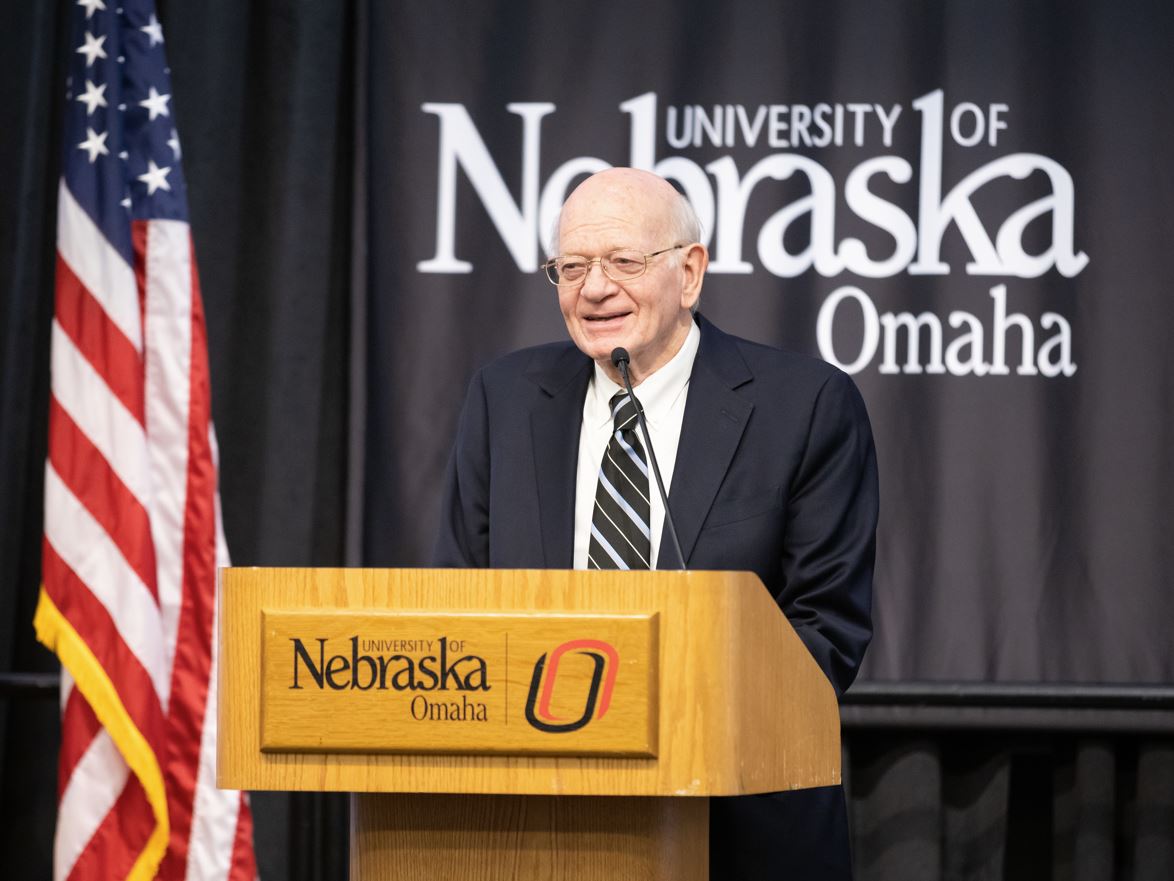
Summary of 50-Year Celebration Keynote Address by Former U.S. Ambassador Ronald Neumann
A keynote address was given by former U.S. Ambassador to Afghanistan Ronald Neumann reflecting on past U.S. involvement in Afghanistan and the ongoing challenges the country faces today.
Ambassador Neumann, who served in Kabul from 2005 to 2007, shared a unique, deeply personal perspective shaped by a diplomatic career spanning multiple decades, and a family connection that began when his father was appointed U.S. ambassador to Afghanistan in the 1960s. Neumann first visited Afghanistan in 1967 and has returned numerous times, witnessing both its periods of peace and the turmoil of conflict.
In his address, Ambassador Neumann was candid in his assessment of the U.S. withdrawal from Afghanistan, criticizing both the policy and its execution. He argued that the 2020 Doha Agreement lacked meaningful enforcement, and that the decision to leave without securing lasting commitments, especially regarding women’s rights and inclusive governance, represented a strategic failure.
“We know what we want, counterterrorism, stability, human rights, but we no longer have the tools to get there,” he said.
Despite the sobering assessment, Neumann emphasized areas where the U.S. and its institutions, including universities, can still make a difference. Chief among these is education. He highlighted the vital role of both in-country and diaspora-based educational efforts, especially for Afghan women and youth, many of whom now live in refugee camps or communities abroad.
He also underscored the importance of maintaining long-term awareness and engagement. As Neumann pointed out, Afghanistan has largely faded from American public consciousness, a trend he believes must be actively countered.
“If Americans aren’t dying, it goes out of our consciousness pretty fast,” he remarked, recalling a recent event where not a single question was asked about Afghanistan.
Neumann urged continued investment in educational exchanges, academic programming, and humanitarian efforts. He also emphasized the moral responsibility the U.S. bears to those Afghans who embraced democratic ideals, many of whom now live in danger or await U.S. visas for resettlement. “Even if you believe leaving was the right policy,” he noted, “we have a moral debt to those who believed in what we stood for.”
The event concluded with thanks from university leadership, recognition of the Center’s rich legacy, and an invitation for attendees to view a special archival and photo displays.
Ambassador Neumann’s address served as both a reflection and a call to action, encouraging ongoing dialogue, educational outreach, and policy awareness, even in the face of uncertainty. As he reminded the audience, Afghanistan is a place known for surprises, and the seeds planted today may yet shape the future.
In closing, Neumann stated it will be important to “keep flames alive for the future even though we cannot see the future.”
The celebration event was followed by a luncheon hosted by the Center with honored guests from the family of founding professor Chris Jung, who tragically passed at the early age of 33, just one year after the Center’s founding. His vision and contributions were remembered and honored.
The milestone was also commemorated in the local news.
UNO's Center for Afghan Studies Commemorates 50 Years
